2014年新版人教版八年级英语下册《Unit9 Have you ever been to a museum》导学案(第3课时)
英语人教版八年级下册Unit 9 Have you ever be
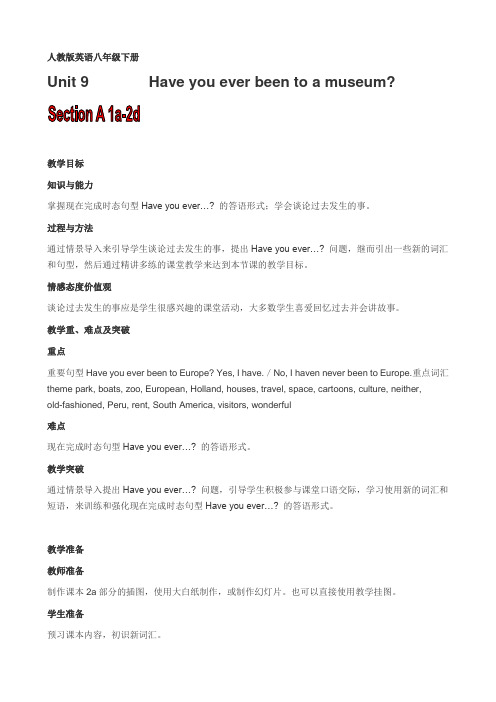
人教版英语八年级下册Unit 9 Have you ever been to a museum?教学目标知识与能力掌握现在完成时态句型Have you ever…? 的答语形式;学会谈论过去发生的事。
过程与方法通过情景导入来引导学生谈论过去发生的事,提出Have you ever…? 问题,继而引出一些新的词汇和句型,然后通过精讲多练的课堂教学来达到本节课的教学目标。
情感态度价值观谈论过去发生的事应是学生很感兴趣的课堂活动,大多数学生喜爱回忆过去并会讲故事。
教学重、难点及突破重点重要句型Have you ever been to Europe? Yes, I have./No, I haven never been to Europe.重点词汇theme park, boats, zoo, European, Holland, houses, travel, space, cartoons, culture, neither,old-fashioned, Peru, rent, South America, visitors, wonderful难点现在完成时态句型Have you ever…? 的答语形式。
教学突破通过情景导入提出Have you ever…? 问题,引导学生积极参与课堂口语交际,学习使用新的词汇和短语,来训练和强化现在完成时态句型Have you ever…? 的答语形式。
教学准备教师准备制作课本2a部分的插图,使用大白纸制作,或制作幻灯片。
也可以直接使用教学挂图。
学生准备预习课本内容,初识新词汇。
教学步骤(第1课时)第一课时教学流程设计教师指导1.情景导入谈论过去发生的事。
2.引导学生进行听力训练。
3.Pairwork小组活动。
学生活动1.谈论过去发生的事。
2.进行听力训练活动。
3.Pairwork小组活动:对话交流和问卷调查。
一、第一教学环节情景导入谈论过去发生的事(约分钟)二、第二教学环节听力训练活动(约分钟)三、第三教学环节Pairwork小组活动(约分钟)四、本课小结引导学生学习Have you ever…? 的答语形式和现在完成时态的用法。
人教版八年级英语下册《Unit 9 Have you ever been to an amusement park.(通用)》教案_1
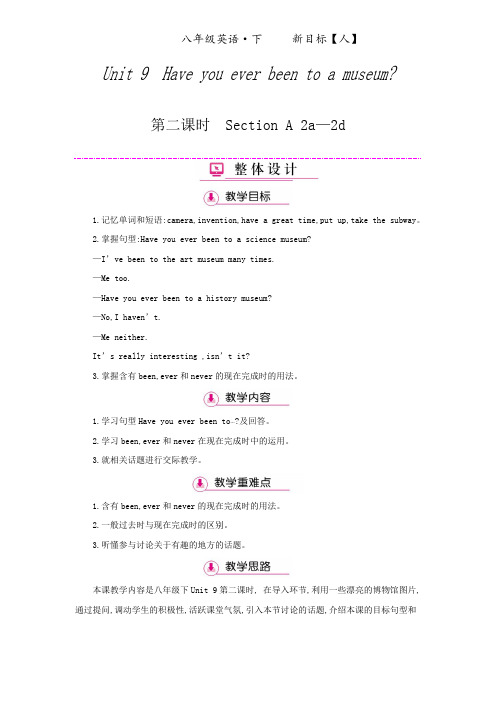
八年级英语·下新目标【人】Unit 9 Have you ever been to a museum?第二课时Section A 2a—2d1.记忆单词和短语:camera,invention,have a great time,put up,take the subway。
2.掌握句型:Have you ever been to a science museum?—I’ve been to the art museum many times.—Me too.—Have you ever been to a history museum?—No,I haven’t.—Me neither.It’s really interesting ,isn’t it?3.掌握含有been,ever和never的现在完成时的用法。
1.学习句型Have you ever been to…?及回答。
2.学习been,ever和never在现在完成时中的运用。
3.就相关话题进行交际教学。
1.含有been,ever和never的现在完成时的用法。
2.一般过去时与现在完成时的区别。
3.听懂参与讨论关于有趣的地方的话题。
本课教学内容是八年级下Unit 9第二课时, 在导入环节,利用一些漂亮的博物馆图片,通过提问,调动学生的积极性,活跃课堂气氛,引入本节讨论的话题,介绍本课的目标句型和单词,在听力环节,注重对学生听力策略的指导,消除学生对听力的“恐惧”心理,让学生能够高效做题。
2d教学是本课综合运用的体现。
通过学习词组、重点句到对话的填空让学生的学习有渐进的过程;抽取学生进行角色扮演,对学生是知识升华的过程。
设计教学PPT,录音机,图片,多媒体。
StepⅠ.Lead in[设计意图]调动学生情感,激活他们头脑中关于过去去过的地方的情感,导入新授。
Leading inT:Boys and girls,do you like traveling?S:Yes.T:Great! Most of you like traveling very much.Me too.Look at the pictures.I went to a lot of places last year.Guess where I went? Use “have/has been to”.S1:You have been to Shanghai.S2:I know you have been to the space museum.S3:You have been to the amusement park.S4:You have been to the zoo.S5:…T:Great! All of you did well.I have been to so many interesting places.Which of these places would you like to visit? Please rank them 1 to 6.space museumhistory museumart museumwater parkzooamusement parkS:…[设计意图]通过情境引入,激发学生情感,便于导入新授内容。
新课标人教版八年级英语下册Unit 9 Have you ever been to an amuse

—So did Tina.
中国地图
蒂娜也去了。
—He has been a soldier for two years.
要点点拨
他已经当了两年兵了。
go inline skating 滑旱冰
—So have I.
我也是。
全析提示
3.Look at the map of the town.Listen and circle the places 助动词 have 和 has 可以与前面的
you hear.
主语缩略’ve 和’s。
看城镇的地图。听录音并圈出你听到的地方。
如:we’ve,they’ve,he’s,
water world 水上世界
it’s 等。
city library 城市图书馆
have not 常缩略为 haven’t,has
fun times amusement park
如果说“欢迎回家”该怎么说呢?
把 1a 中你的回答和你搭档的回答对照一下。
Wele back home!
4.For me,“I have to!” is number two.
对我来说“I have to!”是第二位的。
要点点拨
5.Listen to a teacher interview a student.Circle the newsletter 业务通讯;新闻信札
route“路线、小路、小巷”,使
The main attraction was a Charlie Chaplin film.
用 X 围也较小。course 表示船的
吸引人的主要是查理·卓别林的电影。
“航道”或飞机的“航线”。
The idea of being a teacher has little attraction to young
八年级英语下册Unit_9_Have_you_ever_been_to_museum_讲解+练习题目+答案

Unit9 知识点和练习附详细参考答案1. invent(1)invent 作动词,意为“发明;创造”。
例如:Edison invented the light bulb. 爱迪生发明了电灯。
(2)invent还可以表示“虚构”。
例如:The whole story was invented. 整个故事是虚构的。
(3)invent的名词形式有两个,一个是inventor(发明者;发明家),另一个是invention (发明物)。
例如:Edison is a great inventor in history.爱迪生是历史上伟大的发明家。
Human history is also a history of great inventions.人类的历史也是一个伟大发明的历史。
【拓展】invent和discover的辨析:(1)invent 意为“发明,发明之物”指“从无到有”。
例如:Alexander Graham Bell invented the telephone in 1876.亚历山大•格雷厄姆•贝尔在1876年发明了电话。
(2)discover 意为“发现”,指“本来就已经存在,但不为人知”的事物。
例如:Columbus discovered America in 1492. 哥伦布在1492年发现了美洲。
2. unbelievableunbelievable作形容词,意为“难以置信的;不真实的”,是由believable“可相信的;可信任的”加否定前缀un-派生而来的。
其动词形式为believe,意为“相信;以为”。
例如:It's unbelievable that you are a writer. 我难相信你是一个作家。
【拓展】un-是个前缀,意为“不”。
例如:happy“高兴的”— unhappy“不高兴的”;lucky“幸运的”— unlucky“不幸的”;important“重要的”— unimportant;“不重要的”;healthy“健康的”— unhealthy“不健康的”。
英语人教版八年级下册《Unit 9 Have you ever been to
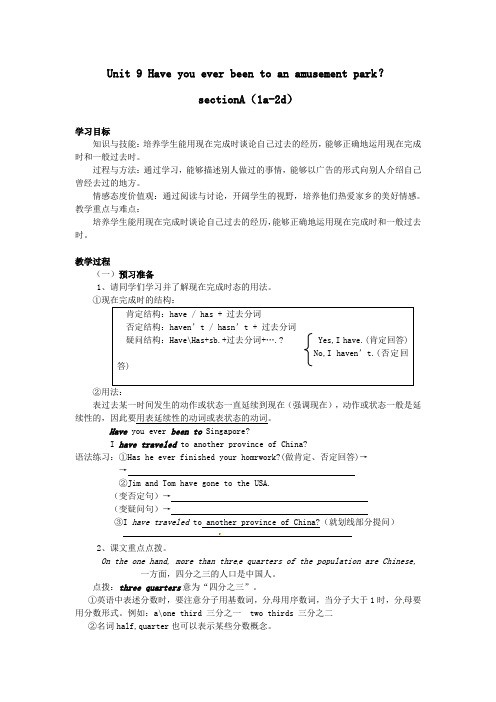
Unit 9 Have you ever been to an amusement park?sectionA(1a-2d)学习目标知识与技能:培养学生能用现在完成时谈论自己过去的经历,能够正确地运用现在完成时和一般过去时。
过程与方法:通过学习,能够描述别人做过的事情,能够以广告的形式向别人介绍自己曾经去过的地方。
情感态度价值观:通过阅读与讨论,开阔学生的视野,培养他们热爱家乡的美好情感。
教学重点与难点:培养学生能用现在完成时谈论自己过去的经历,能够正确地运用现在完成时和一般过去时。
教学过程(一)预习准备1、请同学们学习并了解现在完成时态的用法。
①现在完成时的结构:②用法:表过去某一时间发生的动作或状态一直延续到现在(强调现在),动作或状态一般是延续性的,因此要用表延续性的动词或表状态的动词。
Have you ever been to Singapore?I have traveled to another province of China?语法练习:①Has he ever finished your homrwork?(做肯定、否定回答)→→②Jim and Tom have gone to the USA.(变否定句)→(变疑问句)→③I have traveled to another province of China?(就划线部分提问)2、课文重点点拨。
On the one hand, more than three quarters of the population are Chinese,一方面,四分之三的人口是中国人。
点拨:three quarters意为“四分之三”。
①英语中表述分数时,要注意分子用基数词,分母用序数词,当分子大于1时,分母要用分数形式。
例如:a\one third 三分之一 two thirds 三分之二②名词half,quarter也可以表示某些分数概念。
新课标人教版八年级英语下册Unit 9 Have You Ever Been to an Amuse

Unit 9 Have You Ever Been to an Amusement Park?一、学习目标:1.掌握现在完成时的用法;2.了解一般过去时、现在完成时和现在完成进行时的意义的区别;3.能够准确使用多种时态谈论自己的经历。
二、学习重点难点:1. 现在完成时由主语+have/has+过去分词构成。
其主要用法如下:I.在未指明具体时间的情况下,现在完成时动词通常可以表示在说话之前已经完成,而后果或影响至今仍存在的动作。
例如:The concert has started. 音乐会已经开始。
I have had breakfast. 我已吃过早饭。
注意:have gone to 和have been to 在意义上有区别。
例如:He has gone to Hong Kong. 他到某某去了。
(他已前往某某,或在途中,或已到达。
说话人暗示他现在不在现场。
)He has been to Hong Kong. 他曾到过某某。
(说话人认为他过去到过某某,现在已不在该地。
言外之意他对某某有所了解。
)II. 现在完成时动词可以表示开始于过去持续到现在(也许还会继续进行下去)的动作或状态。
例如:1) I have studied English since last year. 我从去年开始学习英语。
2) She has lived in Beijing for five years. 她住在已经五年了。
注意:e, go , leave, arrive, buy, lose, receive, join, die, bury 和marry 等动词所表示的动作是一时的,不能延续的,故不能与for …,since …等开头的表示一段时间的状语连用。
不过,这些词用于否定句则可以与表示持续的时间状语连用,即动作的不发生是可以持续的。
例如:不能说:*He has e to Beijing for two years.*He has bought that book for three weeks.*He has joined the Army for one and a half years.*His grandma has died for nine months.* I have received his letter for a month.可以说:He has been in Beijing for two years.He has had that book for three weeks.He has been in the army for one and a half years.His grandma has been dead for nine months.I haven't received his letter for almost a month.或者:It is two years since he came to Beijing.It is three weeks since he bought that book.It is one and a half years since he joined the Army.It is nine months since his grandma died.2. 现在完成时把过去的动作和现在的结果联系起来,一般过去时只限于表示过去的动作本身,与现在的结果无关。
英语人教版八年级下册unit 9 Have you ever been ...

.课题:Go For It! 八年级下Unit 9. Have you ever been to an amusement park? (第一课时:听说课)教学目的:1.通过听力训练及对话练习、调查活动等引出第九单元关于现在完成时态的用法。
2.重点操练句型:Have you ever been to…?3.利用多媒体教学,使学生开拓视野,增强学习英语的兴趣。
学生分析:学生已经学过一般过去时态的用法,在Unit6初步接触过现在完成时,但没有接触多媒体课堂环境。
教学步骤:Ⅰ.Watch MTV & Disneyland.Ⅱ.Greetings & Revision.Ⅲ.Presentation:A.Ss learn the new words according to the pictures.B.Show a photo, present the patterns:T: I have ever been to Zimalin Park,but I haven’t been to Beijing.Have you ever been to Zimalin Park?S1: Yes, I have. / No, I haven’t. How about you?T: Me, too. / Me, neither.Ⅳ.Activities:Task 1: Pairwork: Ss talk about if they have ever been tosomewhere, using the pictures. Four pairs act outthe conversations.Task 2:1a-1b.Task 3: Make a survey and have reports.Task 4: Guessing game.Ⅴ.Summary & Homework.。
人教新目标版初中英语八年级下册Unit9Haveyoueverbeentoamuseum要点讲解
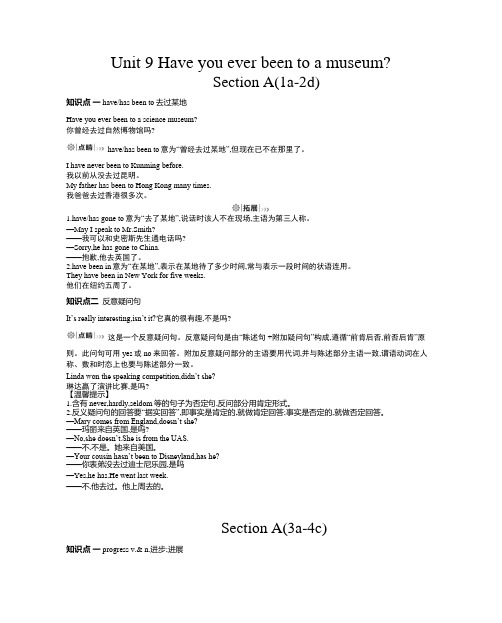
Unit 9 Have you ever been to a museum?Section A(1a-2d)知识点一have/has been to去过某地Have you ever been to a science museum?你曾经去过自然博物馆吗?have/has been to意为“曾经去过某地”,但现在已不在那里了。
I have never been to Kunming before.我以前从没去过昆明。
My father has been to Hong Kong many times.我爸爸去过香港很多次。
1.have/has gone to意为“去了某地”,说话时该人不在现场,主语为第三人称。
—May I speak to Mr.Smith?——我可以和史密斯先生通电话吗?—Sorry,he has gone to China.——抱歉,他去英国了。
2.have been in意为“在某地”,表示在某地待了多少时间,常与表示一段时间的状语连用。
They have been in New York for five weeks.他们在纽约五周了。
知识点二反意疑问句It’s really interesting,isn’t it?它真的很有趣,不是吗?这是一个反意疑问句。
反意疑问句是由“陈述句 +附加疑问句”构成,遵循“前肯后否,前否后肯”原则。
此问句可用yes或no来回答。
附加反意疑问部分的主语要用代词,并与陈述部分主语一致,谓语动词在人称、数和时态上也要与陈述部分一致。
Linda won the speaking competition,didn’t she?琳达赢了演讲比赛,是吗?【温馨提示】1.含有never,hardly,seldom等的句子为否定句,反问部分用肯定形式。
2.反义疑问句的回答要“据实回答”,即事实是肯定的,就做肯定回答;事实是否定的,就做否定回答。
—Mary comes from England,doesn’t she?——玛丽来自英国,是吗?—No,she doesn’t.She is from the UAS.——不,不是。
初中英语人教版八年级下册Unit 9 Have you ever been to a

Unit 9 Have you ever been to a museum?A-3a ReadingTask 1 Fast-reading Read the whole passage and fill in the blanksTask 2 Careful-reading Read again and finish the exercisePara 1Ken:The most interesting museum I’ve ever been to is the American Computer Museum. They have information(信息) about different computers and who invented (创造)them. The old computers were much bigger. It’s unbelievable(难以置信的) that technology(科技) has progressed(进步)in such a rapid(迅速的)way! I’ve also learned that there was a special computer. It could play chess even better than humans. I wonder(想知道)how much more computers will be able to do in the future.Choose the right answer.( ) You CANNOT find_______ in the American Computer Museum.A. information about different computersB. information about who invented computersC. A special computer that could play soccer better than humans.Para 2A my:I’ve recently been to a very unusual(特别的) museum in India, the International Museumof Toilets(厕所). I just couldn’t believe my eyes when I saw so many different kinds of toilets there. The museum teaches people about the history and development of toilets. It also encourages (鼓励)governments and social(社会的) groups to think about ways to improve(改善)toilets in the future.Ture or Forse.( ) The International Museum of Toilets is in India.( ) The museum teaches people how to go to toilet.( ) The museum encourages governments and social groups to try to improve toilets in the future.Para 3Linlin: Last year I went to the Hangzhou National Tea Museum. It’s a relaxing and peaceful(安宁的) place near a lake. The tea art performances(表演) show how to make a perfect(完美的) cup of tea with beautiful tea sets(茶具). Watching the tea preparation is just as enjoyable(愉悦的) as drinking the tea itself(它自己). I’ve finally realized(意识到) why my grandpa loves drinking tea and collecting tea sets.Answer the following questions1. What does the Tea art performance(表演)show?2.Who loves drinking tea and collecting tea sets(茶具)?Task 3. After-reading Translation1.The most interesting museum I’ve ever been to is the American Computer Museum.2.I just couldn't believe my eyes when I saw so many different kinds of toilets there.3.我曾经去过印度一个非常特别的博物馆--- 国际厕所博物馆。
八年级英语下册Unit9Haveyoueverbeentoanamusementpark词汇详细用法人教新目标版

Unit 9 Have you ever been to an amusement park ?68页1.amusement [ u ] 娱乐、消遣an amusement park 游乐场Have you ever been to an amusement park? 你曾经去过一个游乐场吗?Fun Times Amusement Park 欢乐时光游乐场。
复习have been to 去过,回来了have gone to 去了,现在不在这里have been in 去了,还在那里2. neither① adj. pron 二者都不Neither answer is correctNeither of the answers is / are correct.Which do you like? Neither I think they’re both ugly.② adv. 也不I don’t know. Me neither. I don’t know, either.70页3. Disneyland 迪斯尼乐园(前无冠词)Have you ever been to Disneyland?In fact, there are now several different Disneyland amusement parks around the world. 事实上,现在世界上有好几处不同的迪斯尼游乐场。
around the world = all over the worldacross China = all over China4. Mickey Mouse 米老鼠5. Donald Duck 唐老鸭6. character①性格I know his character very well.②汉字Chinese characters③人物、角色famous characters from Chinese historyDisney characters 迪斯尼人物Mickey Mouse and Donald Duck are famous Disney characters.7. seen see的过去分词。
人教版 八年级英语 下册 Unit_9_Have_you_ever_been_to_a_museum

dish.
Tapescripts:
Boy 1: So, Peter, how long have you been in China? Peter: I’ve been here for two weeks, but I’m going back to Australia tomorrow. Boy 1: Have you traveled much? Peter: Yes, I have. I’ve seen many interesting things. Boy 1: Have you visited the Palace Museum? Peter: Yes, I have. I went there last week. It was wonderful. There were so many beautiful treasures. Boy 1: And have you been to the Great Wall?
1st listening
1b
Listen to a student interviewing a foreign student. Check (√) the questions you hear.
___√_ Have you visited the Palace Museum?
___√_ Have you been to the Great Wall?
人教版八年级英语下册Unit9 Have you ever been to a museum知识点梳理及单元复习
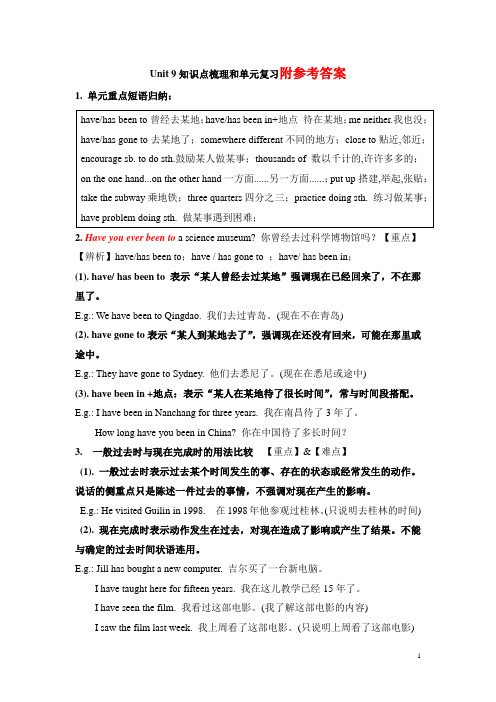
Unit 9知识点梳理和单元复习附参考答案1. 单元重点短语归纳:have/has been to曾经去某地;have/has been in+地点待在某地;me neither.我也没;have/has gone to去某地了;somewhere different不同的地方;close to贴近,邻近;encourage sb. to do sth.鼓励某人做某事;thousands of 数以千计的,许许多多的;on the one hand...on the other hand一方面......另一方面......;put up搭建,举起,张贴;take the subway乘地铁;three quarters四分之三;practice doing sth. 练习做某事;have problem doing sth. 做某事遇到困难;2. Have you ever been to a science museum? 你曾经去过科学博物馆吗?【重点】【辨析】have/has been to;have / has gone to ;have/ has been in;(1). have/ has been to 表示“某人曾经去过某地”强调现在已经回来了,不在那里了。
E.g.: We have been to Qingdao. 我们去过青岛。
(现在不在青岛)(2). have gone to表示“某人到某地去了”,强调现在还没有回来,可能在那里或途中。
E.g.: They have gone to Sydney. 他们去悉尼了。
(现在在悉尼或途中)(3). have been in +地点:表示“某人在某地待了很长时间”,常与时间段搭配。
E.g.: I have been in Nanchang for three years. 我在南昌待了3年了。
How long have you been in China? 你在中国待了多长时间?3. 一般过去时与现在完成时的用法比较【重点】&【难点】(1). 一般过去时表示过去某个时间发生的事、存在的状态或经常发生的动作。
八年级英语下册 Unit 9 Have you ever been to a museum语法专题—

3.—Have you seen Dr.Qian recently? —No.He _C___ Japan for an important meeting.He'll come back next week. A.has gone B.has been to C.has gone to D.has been 4.—Have you __C__ been to Guangxi? —Yes,I have.I ________ there last summer. A.ever;go B.never;went C.ever;went D.never;go
第8页
9.We went to the science museum last week.(对画线部分提问) ___W__h_e_n__d_id___ you __g_o_ to the science museum? 10.My parents have been to the Great Wall.(对画线部分提问) __W__h_e_r_e_h_a_v_e__ your parents__b_e_e_n___?
第9页
三、依据对话内容,用have/has been(to)或have/has gone(to)填空。 A:Hi,Roger! Where is everybody?The house is very quiet. B:Well,Mom 11.__h_a_s__g_o_n_e_t_o____ the cinema with Jane. A:How about your sister? B:She's taking a shower right now because she 12.__h_a_s_b_e_e_n__to__ the gym(健身房). A:I 13._h__a_ve__b_e_e_n_t_o__ the gym twice this week.It's really tiring.
英语八年级下册 Unit9 Have you ever been to a museum单元短语过关

人教版英语八年级下册第九单元短语过关Unit 9 Have you ever been to a museum?1. a science museum 一个科学博物馆2. a space museum 一个太空博物馆3. a history museum 一个历史博物馆4.an art museum 一个艺术博物馆5.water park 水上乐园6.amusement park 游乐场7.somewhere different 某个不同的地方;不定副词,后接形容词;例如:For my next vacation , I ‘d like to go somewhere different. 下次度假,我想去个不同的地方。
st year 去年9.at night在夜晚;at noon在中午10.have \ has been to ... 去过...;例如:I have been to a wonderful placewith big gardens. 我去过一个带有很多花园的美景之地。
have \ has gone to ... 去了;例如:She can’t find Mr. Green , he has gone to Beijing. 她不能找到格林先生,他去了北京。
11.go skating 去滑冰12.take the subway 乘坐地铁13.camp in the mountains 在山上野营;例如:During the summervacation , we camped in the mountains and it was fun. 暑假期间,我们在山上野营,非常有趣。
14.put up the tent 搭建帐篷;put up 还可以表示张贴;例如:They putup their tent and slept under the tree.他们搭建好帐篷,在树下睡了。
八年级英语下册Unit9Haveyoueverbeentoamuseum单元语法知识梳理人教版

Unit 9 Have you ever been to a museum现在完成时(Ⅱ)1.现在完成时表示经历的用法现在完成时常用have been to(去过),ever(曾经),never(从没)等表示经历。
用法说明示例have / has been to表示去过某地,可以与never,ever,just,once等连用。
Mr. Smith has ever been to China three times.史密斯先生曾去过中国三次。
ever常用于现在完成时的一般疑问句中,放在主语之后,过去分词之前。
Have you ever visited the Palace Museum? 你曾参观过故宫博物馆吗?never表示否定,用在助动词have / has之后,过去分词之前。
表示否定的简短回答可以用neither。
—I have never been to Hong Kong.我从来没去过香港。
—Me neither.我也没去过。
2.have/ has been to与have / has gone to的用法区别用法说明示例have/ has been to意为“去过某地”,表示去过某地,现在已经回来了,通常与表示次数的状语连用,如twice,several times,ever,never等She has been to Europe twice.她去过欧洲两次。
(已经回来了)I have never been to the Great Wall.我从未去过长城。
have / has gone to意为“去了某地”,表示到某地去了,强调说话时去某地的人不在场(可能在途中,也可能已到达)。
—Where is Jim? 吉姆在哪里?—He has gone to England.他去英国了。
(现在不在这里)若have/ has been to或have / has gone to后接副词,则省略to。
- 1、下载文档前请自行甄别文档内容的完整性,平台不提供额外的编辑、内容补充、找答案等附加服务。
- 2、"仅部分预览"的文档,不可在线预览部分如存在完整性等问题,可反馈申请退款(可完整预览的文档不适用该条件!)。
- 3、如文档侵犯您的权益,请联系客服反馈,我们会尽快为您处理(人工客服工作时间:9:00-18:30)。
八年级(下)英语导学案
主备人: 授课时间:2014.6 班级: 组别: 姓名:
Topic Unit9 Have you ever been to a museum? Section A 4a —1d (语法课&听说课) II .While-class
1.学生拼读单词,检测68页单词。
2.检查68页4a ,4b 。
学生说出答案并讲明原因。
3.学生问答,完成4c 的表格。
4.学习Section B 。
5.仿造下面的对话进行练习。
T: Have you ever been to Disneyland? S1:No ,I haven’t.
T: Would you like to go to Disneyland? S1: Yes.
6.展示书中1a 的图片,学生将图片和名字正确搭配, 然后让学生像上面那样进行问答。
7.学生首先读1b 中的句子,预测所要涉及的问题,然后听录音,完成1b 。
8.再听一次 学生完成表格1c 。
9.让学生再说出一些名胜古迹或旅游的好地方,然后与同伴互问:Have you visited...? Have you been to...? Have you seen.....? 当堂检测:
1. China has changed a lot.(改为一般疑问句) _____China _____ _____ _____?
2. I have been to the space museum.(对划线部分提问) _____ _____you been?
3.Have you ever visited the Bird’s Nest?(回答) Yes, _____ _____.
No, _____ _____.
【Study-aims 】
1. 全体学生能会背本课单词及短语:
German, theme, ride, province ,a couple of ,many times, German paintings, an amusement park with a special theme, on the boat
2. 大多数学生能正确掌握以下句型并能用完成时的句子进行初步的问答。
Have you ever +动词过去分词+……? Have you been to+……? I have never been to +...
3. 学习策略:通过学生读1b 预测答案,是学生更好的达到听力的效果。
【Key & difficult points 】
正确掌握现在完成的构成并能较熟练的进行应用。
【Learning procedure 】 I .Pre —class
A.写出下列动词的过去分词。
come______ arrive ______ see______ go______ take______ visit ______ try______ be______ B 根据汉语意思完成句子。
他已经去过台湾了。
He _____ _____ _____ Taiwan. 他们来上海大约两年了。
They _____ _____ _____ Shanghai for about two years. 小结:
III. Post-class
【Blackboard Design】。
